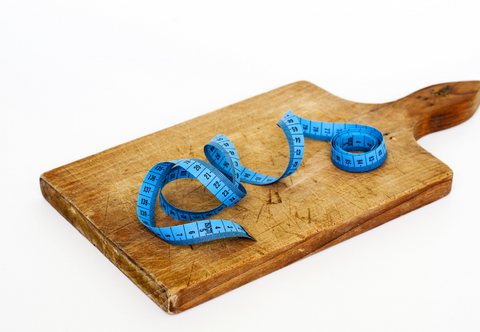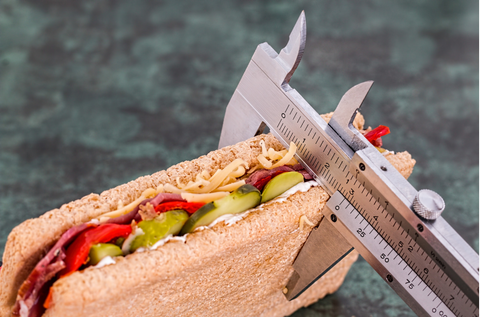Why do diets fail so quickly and why can't we seem to keep the weight off?

It’s New Year’s Day. Linda spent New Year’s Eve drinking and eating anything and everything she desired because these items would be ‘forbidden’ in the new year. Linda’s New Year’s resolution is to finally lose all the weight she accumulated throughout the years and maybe even fit into those old pair of blue jeans again. She started off the first day of January strong. Linda went to the grocery store and purchased all the healthy produce and clean foods to fill up her refrigerator and pantry. Reluctantly, her husband agreed to eat healthier but was only on board to make her happy. Finally, Linda tried out that new recipe that she had been hesitant to make. She ended the day eating healthier than she had in months.
Linda woke up the next morning and immediately went to the bathroom to assess her progress. She felt happy with her choices the day prior and wanted to continue these changes. But first, she needed to weigh herself. Linda stepped on the scale, waited a few moments and stood there in shock. The number on the scale did not change. Linda did absolutely everything she was supposed to do, but yet had nothing to show for it. Now that healthy breakfast seems a little less appetizing and going to the gym is the last place she wants to be. That night she shared a dessert with her husband and the next day she skipped the gym. That Friday was Linda’s sister’s birthday and she decided to have a cheat day. This cheat day turned into a cheat weekend. Linda continues to purchase healthy foods and pay for that gym membership, but that healthy food just sits in the refrigerator and that membership goes unused. Linda gave up on that resolution and said to herself, “Maybe next year.”
Linda is not alone. Millions of Americans go through a very similar process each year. Research conducted by Strava, a social network for athletes, analyzed over 31.5 million online global activities. Based on this data, research concluded that January 12th usually marks the end of New Year’s resolutions (Khalil, 2018).
What exactly happens during those twelve days that result in failed resolutions? Why do diets fail so quickly, and why can’t we seem to keep the weight off? Diet adherence can be negatively impacted by excessive restriction, lack of support, and preparation (Verma, 2018). In the wise words of Benjamin Franklin, “By failing to prepare, you are preparing to fail.” In terms of weight gain, this is more complicated. From a “calorie-in” versus “calorie-out” standpoint, excessive calorie consumption by the means of snacking may be to blame.
Diet failure is individualized, however, dieting often comes with the preconceived notion that you must excessively restrict your diet to obtain desired results, when in fact, cutting too many calories or eliminating food groups may be the primary reason our New Year’s resolutions are failing. For healthy weight loss, professionals recommend losing no more than one pound a week. To achieve this rate, one must eliminate 500 calories a day by exercising, consuming a calorie deficit, or a combination of the two. Since one pound of fat is approximately 3,500 calories, a calorie deficit of 500 calories a day for one week would put an individual on track to lose one pound a week. However, this is easier said than done.

Our basic physiological processes functions optimally in homeostasis. Hence, when we begin a diet, this internal balance is disrupted, and many metabolic changes occur. Professor Colleen McCrief, Director of the Didactic Program in Dietetics at the Sage Colleges and a Registered Dietitian Nutritionist, said that restricting calories or omitting food groups causes our body to “panic.”
“Pertaining to weight loss, most diet changes include restrictions. Internally, this cues our body to panic. [Such as,] ‘I don’t have enough energy,’ or ‘When is my next meal?’. This increases stress hormones, hunger related hormones, and decreases fullness-producing hormones. We in turn, become preoccupied with food. Those self-imposed restrictions become nearly impossible to maintain…” (McCrief).
Often, food groups and specific macronutrients (protein, fat, and carbohydrates) are targeted by dieters as the primary mechanism to achieve weight loss. As long as you don’t have a medical condition, such as Celiac Disease or an allergy, consuming all of the food groups is important to meet both macronutrient and micronutrient (vitamins & minerals) daily values. For instance, the Gluten-free diet was never intended for weight loss, but rather a treatment for Celiac disease. Avoiding gluten by decreasing grain intake without a medical reason can result in a host of medical implications, according to Jennifer McDaniel, a registered dietitian in St. Louis. McDaniel adds that gluten avoidance may lead to micronutrient deficiencies. Wheat is a great source of thiamine and B vitamins and has a positive impact on reducing the risk of heart disease and Type 2 Diabetes (Costa, 2015).

The USDA Center for Nutrition Policy and Promotion distributes a nutrition guide, called MyPlate, which replaces the food pyramid of the past. MyPlate recommendations include a number of servings for each food group in order to achieve target micronutrient levels. Dieters should reference these recommendations before executing an especially restrictive diet to ensure the body is getting what it needs for good health.
Often, when wanting to lose weight, we look for the support of family and friends. We want to involve the family in making healthy food choices consistently. However, this is not realistic. Your loved ones are there to support and motivate you to stick to your resolution, but it is ultimately up to you to be accountable for your actions. A supportive environment is also a necessary component. Purchasing healthy foods to fill your kitchen rather than junk food helps create this environment. The proverb “Out of sight, out of mind,” conveys the idea that if something is not in direct sight, you will not remember it. Therefore, only having healthy foods available won’t trigger those cravings. In addition, you can advocate to create a healthier workplace to get others involved and eliminate additional temptations.

Above all, the most important factor for diet adherence is preparing in advanced. It is absolutely necessary to have a plan. This includes planning out your grocery list and recipes in advanced, considering future events to ensure consistency, and considering if you are mentally prepared and equipped to make these dietary changes. What is your motivation to change? Linda’s motivation was to see a decrease number on the scale and fit into old pieces of clothing again. In fact, a study published in the Journal of Health Psychology, found that participants would sacrifice their health in order to achieve a lower body weight (Buchanan & Sheffield, 2017). Weight is a variable measurement due to the changes in how much water we are holding, our activities, stress and so on. Therefore, finding an additional, alternative measurement to measure progress, such as waist circumference and measuring biweekly, would be a greater motivator than just the number on the scale.
In regard to weight gain, a calorie surplus causes weight gain in healthy individuals. Consuming excess calories can be due to behaviors such as snacking or drinking your calories. In a recent IRi (market research company) State of the Snacking Industry Webinar, led by executive VP Sally Lyons Wyatt, IRi found that consumers who eat three or more snacks a day is up four percent to 47% (Cabrey, 2019). Although snack foods have become healthier, they still deliver far more sugar than a typical American meal, so the trend may in fact be a net negative. Whereas drinking your calories is a subtle, yet substantial way, for a massive number of calories to enter your diet. A 2013 cross-sectional survey found that with each 10-oz increase in sugar sweetened beverage consumption, such as sodas, juices, or sports drinks, the likelihood of obesity also increased (Ruff et al., 2014). Assessing all parts of diets, including beverages, is key to keeping the weight off.
Unfortunately, there are mixed nutrition messages spread all over the internet. If you are unsure where to start or want to make a permanent dietary change, talk to your doctor or a registered dietitian. These professionals make scientific, evidence-based recommendations that are proven time and time again to work. Not to mention these plans are individualized to meet your needs and goals. Resolutions fail for a variety of reasons, however, preparing in advanced, gaining a support system through family or an online support group, and starting off slowly and not aggressively are key to making it past January 12th. From a dietitian standpoint, McCrief believes that there are “non-restrictive ways” to achieve improved health through eating. Therefore, make a plan, be specific with your goals, and don’t make excuses. Go in knowing that diet is not a permanent change. Structuring your diet around short-term goals, where you can achieve early and regular wins, will help improve long-term adherence. Diets of indefinite length are daunting. Achieve your realistic goal first, then set another small goal to continue your lifestyle change. After all, change doesn’t need to start on New Year’s Day or on a Monday. Change can start now, but you have to be the one to initiate the change and stay consistent.
Written by Victoria Opalka, June 2019

Victoria is a nutritionist based in the Capital Region of New York. She graduated with a bachelors degree in nutrition science from Russell Sage College of Troy in 2019. She is currently working towards the RDN credentials.


